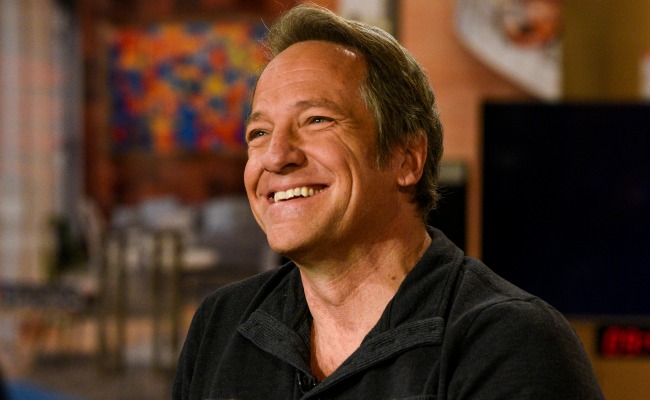
Though arguments persist about the true state of the economy and who deserves credit and/or blame, Mike Rowe is focused on an issue that is too often ignored: the skills gap and the existence of 6.6 million good jobs that have gone unclaimed. Rowe is tireless in his efforts to chip away at that total, overseeing a foundation that works to put up scholarships that train people for the so-called “Dirty Jobs” that he’s long been synonymous with thanks to his time hosting the Discovery Channel show of the same name.
We spoke with Rowe recently about the value of those jobs, his efforts to raise money for job training, his weariness about getting too political, and the nature of what that means in 2018, and whether the world could use fresh episodes of Dirty Jobs.
So you’re working with Wolverine boots right now — what are they doing to help you guys out at mikeroweWORKS?
Well, Wolverine has been a great partner now for the last few years. They’ve donated hundreds of thousands of dollars to our foundation. They’re one of a couple dozen companies that I’ve partnered with over the years, but they’re… It’s just a perfect match. Their concerns for the skills gap and their concerns for a skilled labor force line up pretty much identically with the reasons that we’ve talked about… the reasons why I started mikeroweWORKS. We’ve just been working together for a while as friends and partners on a foundation side. That’s really what the relationship has been about. This year, they’ve allocated 150 pairs of my actual boots (the 1,000 Milers Rowe has worn for a decade), the exact boots that I’m wearing, and allowed us to sell them and keep all of the money (available from August 28 through September 4). So it’s a great way to pick up a quick $55,000-60,000 for the Work Ethic Scholarship Program.
You hear President Trump’s description of how the economy is going. He’s very plainly said, “It’s going great!” and it’s the “best it’s ever been!” Does language like that hurt with something like the skills gap, because people don’t necessarily realize that there are these issues underneath that rosy picture?
It’s tricky, because to say the economy is going great is a very macro thing to say. I think he’s right in general terms, but that’s cold comfort to a lot of people for whom the economy is not going great. Look, the reason I avoid politics is that everything you say as a politician has to, by definition, be a generalization. You can only talk about the value of education in a very broad way. You can’t really talk about what’s best for the individual. You have to talk about what’s best for the most people. I think maybe the smarter way to answer your question if you don’t mind me free-associating: It’s just to talk about the fact that the skills gap, like everything else, has become politicized. Because the skills gap, fundamentally, is proof that opportunity exists. Today, unfortunately, if I go out into the world, whether it’s with Anderson Cooper or with Tucker Carlson and talk about the existence of opportunity, half of the country hears that as something else. They hear it as a challenge. Right?
The reason the skills gap gets politicized is because opportunity has become politicized. People have to try and figure out what that really means to them. For instance, if I tell you that there are 6 million jobs today that can’t be filled, typically my friends on the right will say, “Well, that’s because people are fundamentally lazy.” My friends on the left will say, “Well, that’s because employers are fundamentally greedy.” The whole thing breaks down on partisan lines. Happily, I’ve been able to avoid all that by keeping the foundation more or less within my control and making sure we focus only on individuals and not groups. That’s where things get bogged down, political, and ugly.

How do you get it across to people that this is something that needs to transcend politics and that it’s important that people need to realize these openings exist and these kinds of jobs can help people live better lives? How do you sell it to a kid in high school right now who maybe has some grand dreams about more creative pursuits? The old phrase, “the world needs ditch-diggers too” isn’t exactly sexy.
The perception of opportunity. Not just the existence of it, but the definition of a good job. That’s the kind of thing that we can actually control. We get to decide what we think a good job is. If a ditch-digger has become a non-aspirational job, well, okay, that happens to be the way the wind’s blowing right now, and I get it. A ditch-digger, in and of itself, is not glamorous, and it’s not sexy, but digging ditches is a rung on a ladder. If you remove that rung, or if you make that rung so unappealing that nobody wants to step on it, then it’s going to be very hard for people in that vertical to get to whatever’s next. You say the world needs ditch-diggers, some people might hear that as like, “Okay, well, that’s all well and good as long as it’s not my kid digging the ditches” or “as long as it’s not me.”
The first thing to do to challenge perception is to say that very few people remain ditch diggers for their entire lives. I know a guy who has 40 plumbers working for him right now. He started his career in the trades digging ditches, then welding, then steamfitting, and then he became entrepreneurial. The first challenge is to disassociate people from the idea that a job and a career are the same thing. They’re not. Nor are they supposed to be. Everybody’s on a path. Successful novelists don’t wake up and become successful novelists. They write for the school paper, and then they do this, and then they do that, et cetera, et cetera. Getting people to think a little differently about the nature of work is part of it…That’s my job, making videos, and making a case for work that’s really important.
Ask the average parent of the average kid in the average school if they want their kid to grow up to be a bootmaker, and most of them will look at you funny. But, talk to the average bootmaker, at a company like Wolverine, and you hear stories of great engagement and authenticity and success and pride and all that other stuff. More companies need to do a better job of telling the story of their employees, not the story of their heritage or the story of all of the stuff that typically gets passed through the PR channels. To really dig down organically and show the employee doing the work, mastering a trade, and ultimately prospering as a result.
I hear what you’re saying about companies telling the story of their employees, but with outsourcing and the tax cuts and the belief that some of these companies pocketed that money… if I saw a company put out a message like that, I’d wonder, “Okay, well, when are they going to cut bait and drop these poor guys?” I wonder if that’s part of the problem too, that people see manufacturing as this dying thing, and that it’s not stable. How do you fight that cynicism?
Well, look. I can’t say that you’re wrong. I can just tell you that that’s not really in my lane. I try and stay in my lane. When I’ve got my foundation hat on… look, it’s a great question for a politician. It’s a great question for a CEO in a manufacturing world, but the only real reason I think I’ve been able to remain somewhat effective in this space is because I don’t overreach with opinions.
I understand. I don’t mean to try to put you in a sensitive spot. To me, it’s something that affects what you’re working on.
Well, again, in a macro way, it does. Rather than really kind of agonize over it… it’s not that I don’t care about it. It’s just that I honestly don’t know what to do about it. Happily, there’s another, bigger challenge for me…we got 2,000 applications for this last round of Work Ethic Scholarships, and the vast majority just didn’t make it. It’s amazing how hard it is to give away a million dollars. I’ve done it more than a few times, but it’s really hard. When you ask people to make a case for themselves, ask them to write an essay, ask them to make a video, ask them to provide references, ask them to do a lot of the things that other scholarship plans don’t, you’d be amazed at how many people just don’t even try. That’s a problem. Big companies with policies that discourage opportunity, that’s a problem. I don’t deal with any of that. I simply say, “If you’re somebody who is willing to learn a skill that’s in demand, I can train you. I can get you trained. Then I can show you hundreds of examples of people who’ve prospered as a result.”
My message, ultimately, is hopeful. I’m saying not because of, but in spite… In spite of all kinds of harebrained political policies, in spite of all kinds of counterintuitive decisions that ultimately lead to unintended consequences, in spite of all of that, in spite of greed, and in spite of laziness on both sides, in spite of all of that, opportunity is alive and well for anybody who’s willing to get up early, stay late, and learn a skill that’s in demand. That, I can prove. There’s not much else I can say that sounds smart about the tertiary issues. I try and stay in that one vertical, because I’ve learned after 10 years of doing this, if I wander too far afield, I’m going to get kicked in the head.

That’s a shame, though. That’s not a shot at you. I get it. You’ve got a goal you’ve got to accomplish here. If you get off the road, it’s not going to help you or help that goal. It’s just a shame where we are right now as a society that we have to all stay so tight in our messaging. We can’t veer into other things that might have an effect.
No, no, look. It’s an important question because I deal with it every single day. I have to own my opinions, but it took a while to figure it out. The only way the whole country hears you is if you argue from the middle. The job becomes remaining balanced and trying to focus on one of the few things that both sides still understand to be important. Work is one of those things. As long as it’s in the headlines, it’s going to be political. I get that. But, what are we doing about it? We do small things. We’ll raise 60 grand selling 150 pair of boots. We’ll use that money to train half a dozen people, maybe a dozen. A year from now, they’ll be working. I’ll tell those tiny stories all day long.
I respect the discipline needed to focus on the smaller stories as opposed to the big topics… little stories that are life-changing for those people.
That goes all the way back to episode one of Dirty Jobs. For me, there are really no new lessons. I just learn the same ones over and over. Dirty Jobs was an enormous show that aired in 210 different countries, but it focused on anonymous people that you didn’t know existed, doing a job you didn’t know existed, in a town you probably couldn’t find on the map. There’s hugeness in smallness. Everything is a combination of micro and macro, I think.
Dirty Jobs was mostly focused on the work. If you got the chance to do another show like that, would you branch out and tell more stories about people’s lives beyond the jobs? Obviously, you do a lot of that with the videos that you do.
Yeah. I’ve kind of done it, in a way. Somebody’s Got To Do It was a version of Dirty Jobs that currently airs on TBN, and CNN before that. Returning The Favor is a version of Somebody’s Got To Do It, now on Facebook. Truth is, every seven or eight years, I just change the title. I’ve been doing the same show for 20 years. It’s really me tapping the country on the shoulder in some way, shape, or form to say, “Hey, what about her? What about him? What about this?” It’s always tempting to try and do more, and networks have always tried to take the basic formula and ratchet it up into something big. I’ve always resisted it, because personally, I think it’s a trap. But I would actually do Dirty Jobs again. I swore I’d never do it again. It’s been six years, but it still airs 10 times a week, and not a day goes by where people don’t stop me and say, “You know something? It could still really be useful to see people who have figured out how to prosper in 2018 by getting dirty, learning a trade, working with their hands.” I think they’re probably right. So never say never.
I just did exactly what I’m saying people shouldn’t do, but everything just turns into politics, and it’s lovely to see things sometimes that aren’t that, because so much of life isn’t that. That’s gotten lost.
People tend to find what they look for, and if you’re looking for something political, it’s never been easier to find it. It was funny, with Dirty Jobs, nobody ever looked at that show to see how much money people were making. I never made it about that. People are surprised to learn that 40, maybe 50 people we featured on Dirty Jobs were multimillionaires. Many of whom started as ditch diggers. We just didn’t take it in that direction, but maybe I should’ve because there’s something going on in the country right now. We don’t equate prosperity and success with certain optics. That’s a mistake because there’s a lot of money in dirt. There’s a lot of money in agriculture. There’s a lot of money in mining. There’s a lot of money in making boots. There’s a lot of money in a lot of things that people don’t really see. Look, getting their attention’s always the key. Doing an entertaining show was more important than giving a lecture. As much as I’d like to give a lecture, nobody wants to hear one. Unless you can get their attention first, you’re really just talking to yourself.
This interview has been edited and condensed for clarity and length.
